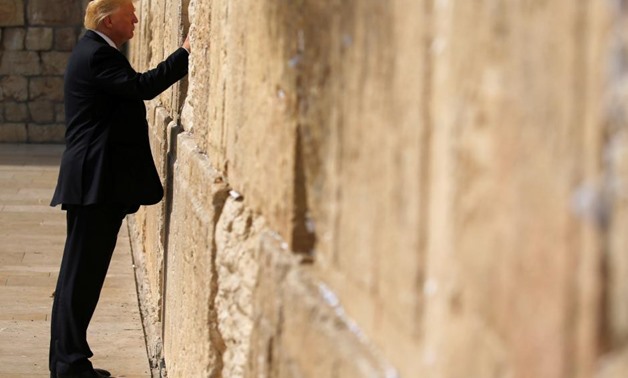
U.S. President Donald Trump places a note in the stones of the Western Wall, Judaism's holiest prayer site, in Jerusalem's Old City May 22, 2017 - REUTERS/Jonathan Ernst
CAIRO – 6 December 2017: Trump missed the deadline on Monday to waive the transfer of the U.S. embassy to Israel from Tel Aviv to Jerusalem. On Wednesday, Trump confirmed the U.S.’s support of Jerusalem as the capital of Israel and his intention to relate the U.S. embassy to the holy city. There was a general expectation that Trump would sign the waiver, as has been the norm in the United States for over two decades; however, this is Donald Trump, who of the most unpredictable people in the world, who unfortunately also holds the world’s most powerful office.
Four reasons why Trump announced the move:
1. Appease his shrinking support base, and oblige by his campaign pledge
2. To act presidential. If you hadn’t heard, Donald J. Trump is President of the U.S.
3. To see his name linked to a significant international policy shift
4. A result of poor advice from his ill-experienced team
Four consequences of this action:
1. Ignite tensions in Jerusalem and other areas between Israelis and Palestinians
2. Revive the wavering pan-Arab support for the Palestinian cause
3. Give Netanyahu the “green light” to continue building settlements.
4. Make it difficult for Arab countries to strengthen ties with Israel
So what of these consequences? Trump has spoken of his desire to strike the “ultimate deal” between Israelis and Palestinians, continuing the rhetoric pushed forward by many of his predecessors. The Israeli-Palestinian dispute is the most intricate and polarizing challenge the world faces, and every President has wanted to stamp their name on a peace deal.
However, formally recognizing Jerusalem as the capital of Israel and relocating the U.S. embassy to the ancient city is an ill-considered move which will likely leave Washington unable to play an effective broker role in future negotiations.
Trump’s decision to formally declare Jerusalem as the capital if Israeli in the eyes of the U.S. will invigorate religious tensions the world over. Jerusalem is a city of major historical and religious significance in Christianity, Judaism and Islam, and Trump’s decision to declare the U.S. position as biased to Israel and Judaism is a metaphorical slap in the face to 1.5 billion Muslims and hundreds of millions of Christians the world over.
With the Old City in Jerusalem covers less than one square kilometer, it is the most sensitive square kilometer on earth.
The responses to Trump’s decision around the Middle East have been consistently hostile, including from Saudi Arabia, the U.S.’s major pillar of support in the region. Trump has been subjected to major criticism from many major allies around the world, including France and Germany. World leaders and major institutions have warned Trump that his announcement could destroy the delicate peace process.
Turkish President Recep Tayyip Erdogan warned trump that, “Jerusalem … is a red line for Muslims,” while the President of the Palestinian National Authority Mahmoud Abbas warned that Trump’s move would lead to the “complete destruction of the peace process.”
 Israeli Prime Minister Benjamin Netanyahu (R) speaks to Republican U.S. presidential candidate Donald Trump during their meeting in New York - REUTERS
Israeli Prime Minister Benjamin Netanyahu (R) speaks to Republican U.S. presidential candidate Donald Trump during their meeting in New York - REUTERS
It has long been codified by the UN that the future status of Jerusalem’s would only be determined through negotiation. This is the general consensus around the world, with all 86 embassies located in Tel Aviv and none in Jerusalem.
While Russia recognizes West Jerusalem as the capital of Israel, its embassy remains in Tel Aviv.
It is likely this will lead to an immediate retaliation, and major protests have already been planned in Jerusalem, the Gaza Strip and the West Bank, with many more expected around the Middle East. The U.S. has told staff at its embassies around the world to stay on alert as there is the potential for a violent response.
As the Arab world and much of the wider Islamic world stands in union with the Palestinians, it is likely Trump’s declaration will lead to a revival in the passionate and direct support for Palestinians in the struggle for statehood in territory usurped by the Zionists.
Although many Arab states have fought destructive wars against Israel in support of the Palestinian cause, this support has wavered in time as the reality of Israel’s entrenched position has become clearer. However, with Trump’s unilateral decision to side with Israel and declare Jerusalem the U.S.’s capital of Israel, the pro-Palestine cause will reinvigorate once again.
 A view of Jerusalem, December 8, 2009 - REUTERS/Ammar Awad
A view of Jerusalem, December 8, 2009 - REUTERS/Ammar Awad
While many countries across the region have become more accustomed to Israel’s existence, Trump’s decision polarizes opinions and will leave less opportunity for positive relations between Israel and its neighbors in the region.
The new embassy is expected to take at least three years to be completed and opened, and by then there is a strong possibility that Trump will no longer be in office, and thus, the stance of the U.S. in moving the embassy may change. The president will continue to sign the six-month waiver of congressional legislation that demands the embassy is moved, however once the new embassy is completed, this will end.
But let’s make it clear, this is Donald J. Trump who has decided to make this move. A man who has already showed a disregard to the rule of law; this move does not come as a great surprise.
Twitter:



Comments
Leave a Comment